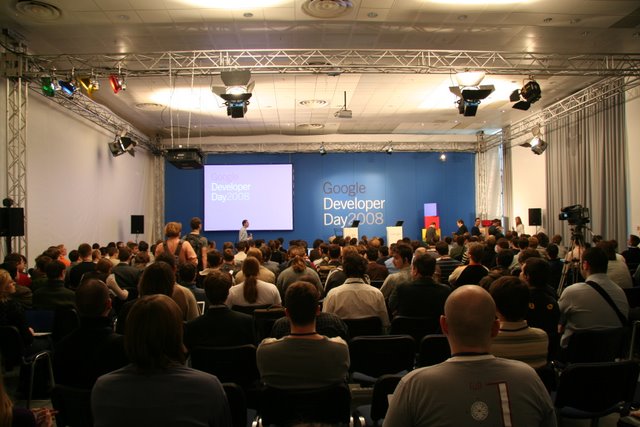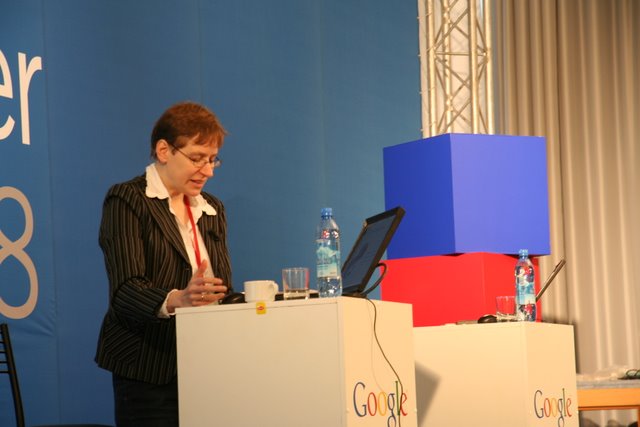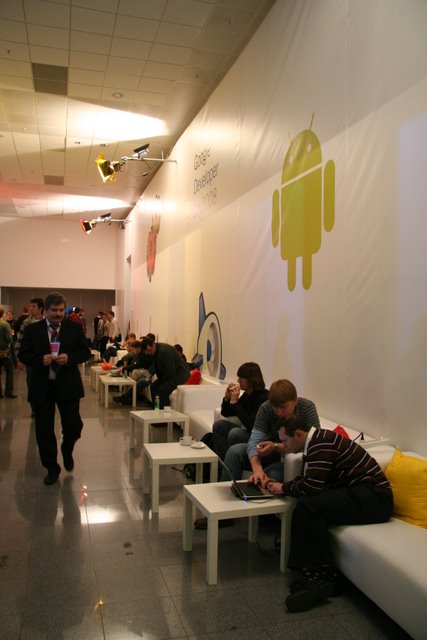How I went to Google Developer Day
Epigraph (or epitaph, but without rhyme?)
On Tuesday, this was a significant event. Mind can not understand Russia. Sometimes, it seems to me that when a Western company finds itself in the open spaces of our motherland, its “integral indicator of intelligence” drops at least twice. Now I will describe how this happens.

Description
Scoop in action
What do you think I saw first thing, slowly approaching the entrance to the business center, where the GDD took place? Yes, yes, you think correctly, I saw Macrosoft . 20 meters before the entrance is a group of Redmond saboteurs, represented by our Soviet students. There were 10 students, they happily shoved at me badges with the words “Ay Lav Microsoft”, “IE-8” (so that he died), “Vizhl Studio 2008” and some other kind of crap. The most useful souvenir stuffed into me was a stand under a beer glass with the proud inscription "MSDN".
- “Well, at least some benefit from it (from MSDN, approx. Ed.) ”, I thought, and went on.
Savok as funial mushroom
I have nothing against Microsoft and Redmond. Winda and Vision Studio are not to blame for the idiots sitting in the Moscow office. Honestly, it was ridiculous - the most notorious Googledogs defiantly threw the enemy attributes in the trash near the entrance to the conference. After such an “advertising move”, I would have dismissed the entire marketing department of Moscow’s Microsoft. I am increasingly convinced that the science of common sense cannot be (I’m talking about marketing. Those who read Kotler will understand me. You need to know the enemy by sight!) .
The idiocy 20 meters before the entrance to the conference was not over. It continued near the reception. After registration, the happy participants received a badge-sized A5 (I exaggerate) the size of the sections, and questionnaires that needed to be filled ... **** (substitute your own version) . ****, because they did not give pens. 99% of the participants came only with laptops, some took a camera. Only our good fellows could think of such a thing. By the way, after the participant submits the completed application forms, he receives a gift set with branded notebooks and pens. Well, is not it idiotic?
')
Do not ask, so humiliate
Eugene Trelevich (Polish girl, what?) Performed at the opening. On her slides, Windows was always written with a small letter - windows, and on the slide, where we talked about developing applications for different operating systems, Mac OS X and Linux were mentioned (and Winduvs was already buried ???) . Maybe I suffer from paranoia, I am seriously ill with my head, but the negative attitude towards Microsoft in the speech of Eugene slipped.

Introduction
The first hour of the conference was wasted. For an hour, Zhenya listed everything that Google had done lately: from Google Maps, ending with App Engine. For a whole hour there were words about nothing, or rather, about what is googling in 5 minutes and reading at 15. The speech was intended for people who first heard about what Google is doing and what it does there. I believe that the “open day for the curious” and “the day of developers” are fundamentally different things. I was bored, I was yawning.

OpenWeb state
Another dead hour. During the brutal hour, Brad Neuberg talked about the development of web technologies.
Open web is five parts:
- Cross Platform
- Open source
- Vendor independence
- Access to the project is open to everyone
- Universality of customers, i.e. browsers.
Brad rubbed about the canvas, SVG, AJAX history, enlightened us, the uninitiated, that you can use the convoy, and it’s better to wait with SVG.
- Thanks, Brad, you're an awesome dude. I got the impression that the person googled a couple of hours, and then the presentation weakened for 20 minutes.
By the way, almost all Google users were with Macs. Brad seems to be taking part in the development of Dojo, well, it remains to wish him success.
I became even more convinced that this conference was not for developers, but for some teapots. I see no reason to go to a conference on web technologies, not knowing about canvas and SVG. Moreover, I see no reason to tell web developers about these things.
The most interesting
Since I am writing my dissertation on the mat. modeling, i need to get an app. And I am more and more disturbed by the thought - how will my application behave under load? That's why I decided to score on a lecture about Chrome + V8 and go to the App Engine lecture.
In my opinion, App Engine is a masterpiece creation. Even my beloved and beloved GWT smokes aside. Developers write programs on Python, upload them to the server ... and that's it. Google will take care of the rest. About load balancing, about setting up a database and a web server, Google will think about everything. It gives developers a runtime environment for their web applications, which are written using the SDK supplied by Google and any (practically) extensions and frameworks. Guys, this is the thing.
The best part - Google offers ORM, instead of traditional queries to a relational database. To do this, they developed a SQL dialect called GQL - Google Query Language. In fact, GQL terribly looks like a JPQL (Java Persistence Query Language) cut off from all sides. To be honest, the api SDK is quite modest, but for version .0.4 it is quite decent.
After lunch, I went to an in-depth study of App Engine. The same speaker, Jon McAlister, already spoke about the structure of the system. For example, get COUNT (*) from a table, i.e. It is not possible to count all the records, because nobody, even the table itself, knows how many records there are. As soon as the size of the table reaches a certain size, it begins to “creep apart” physically to other servers. Therefore, you cannot make a select from a table without specifying limit. Even if the programmer did not specify a limit, he will be forcibly set - no more than 1000 entries.
Disappointment
After an in-depth study of App Engine, I headed for a lecture on GWT. There will be no comments at all. The speaker honestly admitted. that it is not a GWT developer, so it was not at all clear what he was doing in this lecture. From the series: "I am not an astrophysicist, but I will tell you about the stars." Thomas Steiner could not answer the most primitive questions, not to mention serious, for example about the use of GWT in freemarker, or, for example, GWT + JPA.
I was disappointed.
Happy end
In general, no doubt, I am pleased that I got on GDD. But I can not say that it was a Developer Day. It was a curious Day, a conference for the curious, but not for developers. The lectures talked about primitive, basic things that, in principle, developers are boring and not interesting. I got real pleasure from the McAlister report.
wet floor

Source: https://habr.com/ru/post/43558/
All Articles